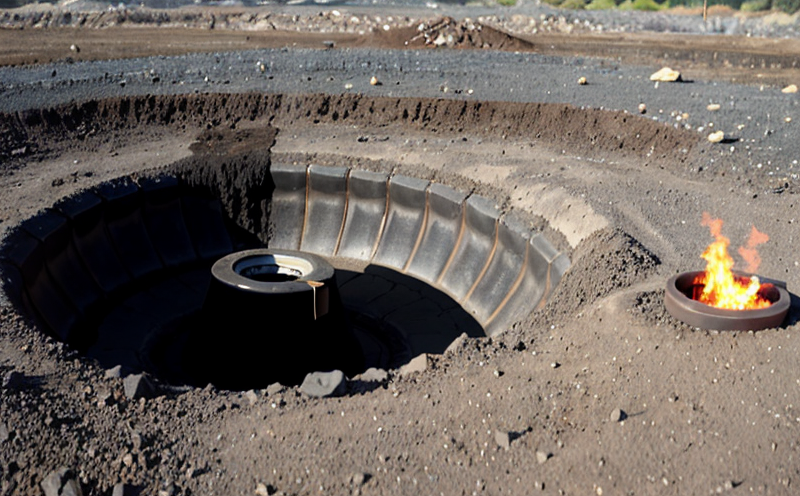EN 15407 Ash Melting Behavior Testing
The EN 15407 standard specifies a method to determine the ash melting behavior of coal and other fossil fuels. This testing is crucial for understanding the combustion characteristics and stability of the fuel during high-temperature processes, such as those found in power plants or industrial furnaces. The test provides critical information on the temperature at which different components within the fuel's ash begin to melt, known as the Softening Temperature (ST), Deformation Temperature (DT), and Flowing Temperature (FT).
The process involves heating a small sample of the coal or fossil fuel in an electric furnace under controlled conditions. The sample is heated incrementally, and its temperature is recorded until it begins to exhibit signs of melting behavior. These signs include softening, deformation, and complete flowability into a liquid state. Understanding these temperatures helps engineers optimize combustion processes, improve boiler design, and ensure efficient operation while minimizing ash-related issues such as fouling or slagging.
The test is particularly important for industries that rely heavily on coal or other fossil fuels for energy production. By ensuring the fuel meets certain melting behavior criteria outlined in EN 15407, operators can enhance operational efficiency and safety. This testing also supports compliance with international standards and environmental regulations, which often require specific melting behavior characteristics to prevent emissions and reduce pollution.
For quality managers and procurement officers, this test ensures that the fuel they source meets the necessary melting behavior requirements for optimal performance in their facilities. R&D engineers can leverage EN 15407 results to develop new fuels or improve existing processes by refining combustion techniques based on real-world data.
- Why Choose This Test:
- To ensure fuel efficiency and reduce operational costs in industrial settings.
- To comply with international standards for quality assurance.
- To prevent environmental issues related to ash formation and pollution.
Applied Standards
The EN 15407 standard is widely recognized in the global market, particularly for coal and fossil fuel testing. This standard provides a consistent method for determining ash melting behavior, which is critical for various industries that depend on these fuels for energy production.
EN 15407 specifies the procedures for heating the sample to observe the temperature at which different components of the ash begin to melt. The test results are essential for assessing the fuel's suitability for specific applications, such as coal-fired power plants or industrial boilers. By adhering to this standard, laboratories ensure that their testing methods are reliable and reproducible, leading to more accurate assessments.
The standard covers various aspects of the testing process, including sample preparation, furnace settings, heating rates, and temperature recording. It also provides guidelines for interpreting the results to determine the melting behavior temperatures (ST, DT, FT). Compliance with EN 15407 ensures that laboratories can provide consistent and accurate data, which is crucial for maintaining quality control in fuel testing.
Other relevant standards include ISO and ASTM, but these are mainly focused on different aspects of material testing. For coal and fossil fuel testing specifically, EN 15407 remains the most appropriate standard due to its detailed specifications tailored to this unique type of fuel.
Why Choose This Test
- Better Understanding of Fuel Behavior: The EN 15407 test provides insight into the specific melting behavior of different components within the coal or fossil fuel, helping to optimize combustion processes.
- Enhanced Operational Efficiency: By knowing the exact temperatures at which the fuel melts, operators can fine-tune their systems for maximum efficiency and minimal waste.
- Environmental Compliance: Ensuring that the fuel meets stringent melting behavior criteria helps prevent environmental issues such as emissions and pollution.
- Improved Product Quality: The test results contribute to higher quality control, ensuring that only fuels meeting specific standards are used in industrial processes.
- Enhanced Safety: Understanding the melting behavior of coal or fossil fuel can help prevent incidents such as slagging and fouling, which could lead to equipment damage or accidents.
- Regulatory Compliance: Adherence to EN 15407 ensures that laboratories meet international standards for quality assurance, making it easier to comply with regulations in different regions.
The EN 15407 test is a vital tool for industries reliant on coal and fossil fuels. It offers valuable insights into the fuel's behavior under high temperatures, helping operators make informed decisions about their processes. By choosing this test, businesses can ensure that they are working with top-tier laboratories capable of delivering precise and reliable results.
Quality and Reliability Assurance
- Consistent Results: The EN 15407 standard ensures that the testing process is consistent, leading to reproducible and reliable results.
- Absolute Accuracy: By following standardized procedures, laboratories can provide accurate data on the melting behavior of coal or fossil fuel samples.
The EN 15407 test plays a crucial role in maintaining high standards of quality and reliability within the mining sector. The consistent application of this standard across different facilities ensures that operators have access to reliable data, which is essential for making informed decisions about their processes. This level of accuracy helps prevent errors or discrepancies that could arise from non-standardized testing methods.
Moreover, laboratories that adhere to EN 15407 are better positioned to meet the stringent requirements set by various regulatory bodies and industry standards. The test results can be used to demonstrate compliance with these regulations, thereby enhancing a company's reputation in the market.
The high level of accuracy provided by this testing method also contributes to improved product quality, ensuring that only fuels meeting specific melting behavior criteria are used in industrial processes. This, in turn, leads to enhanced operational efficiency and reduced costs associated with fuel-related issues such as emissions or pollution.





